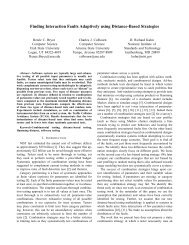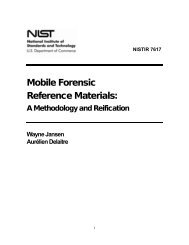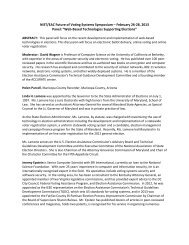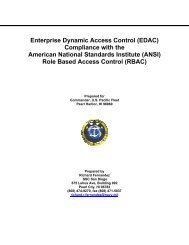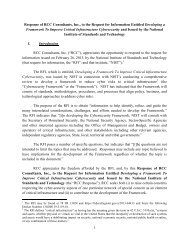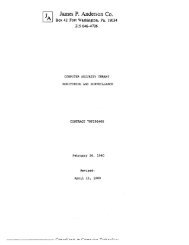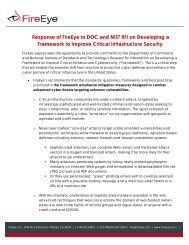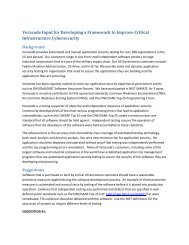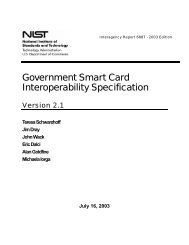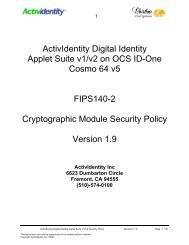Part 1: General - Computer Security Resource Center - National ...
Part 1: General - Computer Security Resource Center - National ...
Part 1: General - Computer Security Resource Center - National ...
Create successful ePaper yourself
Turn your PDF publications into a flip-book with our unique Google optimized e-Paper software.
March, 2007<br />
5.4 Assurances<br />
When cryptographic keys and domain parameters are stored or distributed they may pass through<br />
unprotected environments. In this case, specific assurances may be required before the key or<br />
domain parameters may be used to perform normal cryptographic operations.<br />
5.4.1 Assurance of Integrity (Also Integrity Protection)<br />
Assurance of integrity shall be obtained prior to using all keying material.<br />
At a minimum, assurance of integrity shall be obtained by verifying that the keying material has<br />
the appropriate format and came from an authorized source. Additional assurance of integrity<br />
may be obtained by the proper use of error detection codes, message authentication codes, and<br />
digital signatures.<br />
5.4.2 Assurance of Domain Parameter Validity<br />
Domain parameters are used by some public key algorithms during the generation of key pairs<br />
and digital signatures, and during the generation of shared secrets that are subsequently used to<br />
derive keying material. Assurance of the validity of the domain parameters is important to<br />
applications of public key cryptography and shall be obtained prior to using them.<br />
Invalid domain parameters could void all intended security for all entities using the domain<br />
parameters. Methods of obtaining assurance of domain parameter validity for DSA, and finite<br />
field discrete log key agreement algorithms are provided in [FIPS186-3] and [SP800-56].<br />
Methods for obtaining this assurance for ECDSA, and the elliptic curve discrete log key<br />
establishment algorithms are provided in [SP800-56].<br />
5.4.3 Assurance of Public Key Validity<br />
Assurance of public key validity shall be obtained on all public keys before using them.<br />
Assurance of validity gives the user confidence that the public key is arithmetically correct. This<br />
reduces the probability of using weak or corrupted keys. Invalid public keys could result in<br />
voiding the intended security, including the security of the operation (i.e., digital signature, key<br />
establishment, encryption), leaking some or all information from the owner's private key, and<br />
leaking some or all information about a private key that is combined with an invalid public key<br />
(as may be done when key agreement or public key encryption is performed). Methods of<br />
obtaining assurance of public key validity for DSA, and finite field discrete log key agreement<br />
algorithms are provided in [FIPS186-3], [SP800-56] and [ANS X9.42]. Methods for obtaining<br />
this assurance for ECDSA, and the elliptic curve discrete log key establishment algorithms are<br />
provided in [SP800-56], [ANSX9.62], and [ANSX9.63]. One of several ways to obtain assurance<br />
of validity is to verify certain mathematical properties that the public key should have. Another<br />
way is to obtain the assurance from a trusted third party that the trusted party validated the<br />
properties.<br />
5.4.4 Assurance of Private Key Possession<br />
Assurance of static private key possession shall be obtained before the use of the corresponding<br />
static public key.<br />
Assurance of possession gives confidence that the claimed owner of the public key actually<br />
possessed the corresponding private key at some time. There are several ways of obtaining<br />
assurance of possession. For specific details regarding assurance of possession of key<br />
57




